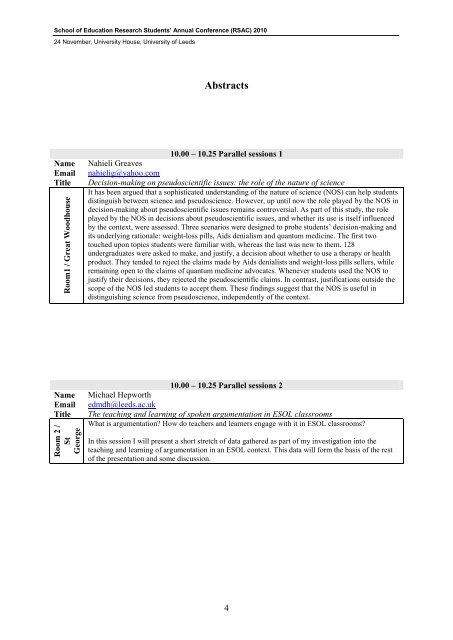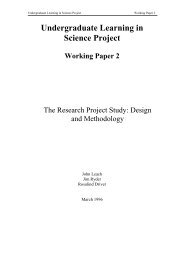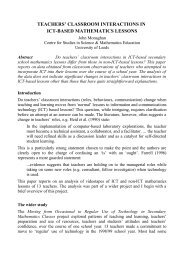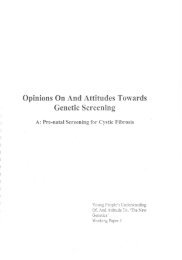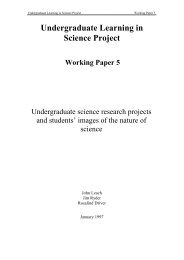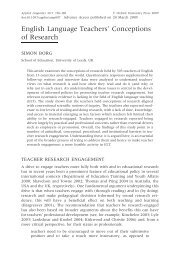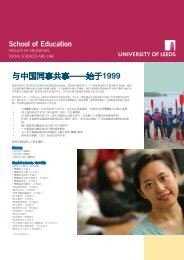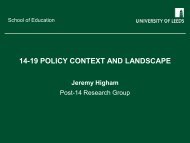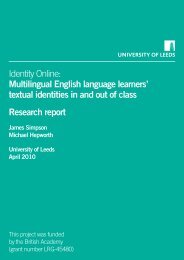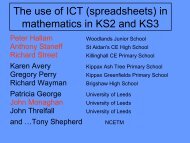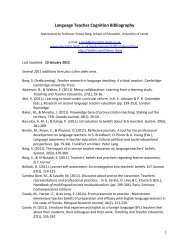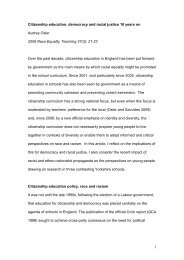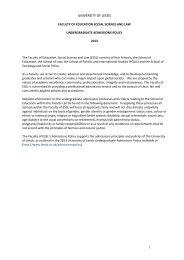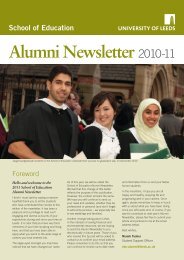Research Students' Annual Conference (RSAC) 2010 - School of ...
Research Students' Annual Conference (RSAC) 2010 - School of ...
Research Students' Annual Conference (RSAC) 2010 - School of ...
Create successful ePaper yourself
Turn your PDF publications into a flip-book with our unique Google optimized e-Paper software.
Room 2 /<br />
St<br />
George<br />
Room1 / Great Woodhouse<br />
<strong>School</strong> <strong>of</strong> Education <strong>Research</strong> Students’ <strong>Annual</strong> <strong>Conference</strong> (<strong>RSAC</strong>) <strong>2010</strong><br />
24 November, University House, University <strong>of</strong> Leeds<br />
Abstracts<br />
Name<br />
Email<br />
Title<br />
10.00 – 10.25 Parallel sessions 1<br />
Nahieli Greaves<br />
nahielig@yahoo.com<br />
Decision-making on pseudoscientific issues: the role <strong>of</strong> the nature <strong>of</strong> science<br />
It has been argued that a sophisticated understanding <strong>of</strong> the nature <strong>of</strong> science (NOS) can help students<br />
distinguish between science and pseudoscience. However, up until now the role played by the NOS in<br />
decision-making about pseudoscientific issues remains controversial. As part <strong>of</strong> this study, the role<br />
played by the NOS in decisions about pseudoscientific issues, and whether its use is itself influenced<br />
by the context, were assessed. Three scenarios were designed to probe students‘ decision-making and<br />
its underlying rationale: weight-loss pills, Aids denialism and quantum medicine. The first two<br />
touched upon topics students were familiar with, whereas the last was new to them. 128<br />
undergraduates were asked to make, and justify, a decision about whether to use a therapy or health<br />
product. They tended to reject the claims made by Aids denialists and weight-loss pills sellers, while<br />
remaining open to the claims <strong>of</strong> quantum medicine advocates. Whenever students used the NOS to<br />
justify their decisions, they rejected the pseudoscientific claims. In contrast, justifications outside the<br />
scope <strong>of</strong> the NOS led students to accept them. These findings suggest that the NOS is useful in<br />
distinguishing science from pseudoscience, independently <strong>of</strong> the context.<br />
Name<br />
Email<br />
Title<br />
10.00 – 10.25 Parallel sessions 2<br />
Michael Hepworth<br />
edmdh@leeds.ac.uk<br />
The teaching and learning <strong>of</strong> spoken argumentation in ESOL classrooms<br />
What is argumentation? How do teachers and learners engage with it in ESOL classrooms?<br />
In this session I will present a short stretch <strong>of</strong> data gathered as part <strong>of</strong> my investigation into the<br />
teaching and learning <strong>of</strong> argumentation in an ESOL context. This data will form the basis <strong>of</strong> the rest<br />
<strong>of</strong> the presentation and some discussion.<br />
4


